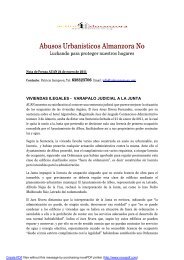European Property Rights and Wrongs - Diana Wallis MEP
European Property Rights and Wrongs - Diana Wallis MEP
European Property Rights and Wrongs - Diana Wallis MEP
You also want an ePaper? Increase the reach of your titles
YUMPU automatically turns print PDFs into web optimized ePapers that Google loves.
puted, perhaps leading to the loss of connection to amenities; zones are applied to<br />
the property perhaps leading to the property being built without valid permission;<br />
or a property purports to be sold free from encumbrance but is in fact subject to a<br />
developer’s mortgage. All these examples could be solved by enquiry with a properly<br />
constituted <strong>and</strong> administered state l<strong>and</strong> registry. Unfortunately not all state<br />
l<strong>and</strong> registries are at an advanced stage of development may not be easy to access,<br />
or the state may not yet centralize information or keep it up to date centrally.<br />
How do they work?<br />
However L<strong>and</strong> Registries are more than just a deposit of information, in some<br />
jurisdictions the actual act of registering a right over property in the Register will<br />
create that right. So in some jurisdictions the absence of registration of a right<br />
would mean the right did not exist, even if the purchaser had h<strong>and</strong>ed over money,<br />
even moved into the property itself. Most systems fall under either the Register<br />
of deeds model where the fact of the transaction is recorded but no right created<br />
via registration, or the Register of title model where the right is created via registration<br />
<strong>and</strong> greater precedence is given to registered rights <strong>and</strong> a greater level of<br />
certainty achieved by reference to the register which the state would “insure” by<br />
compensation to anyone who loses through an error in the Register or its administration.<br />
The second model gives a high degree of certainty but requires a high<br />
degree of administration, infrastructure <strong>and</strong> state financial guarantee. It is the<br />
view of the <strong>European</strong> L<strong>and</strong> Registry (ELRA) project that this high degree of legal<br />
certainty is essential throughout the EU if real property transactions are to be as<br />
safe as possible facilitating the wider aims of the EU.<br />
In jurisdictions with administratively advanced L<strong>and</strong> Registries it is easy to take<br />
for granted the peace of mind offered by a State guaranteed source of information,<br />
reliable <strong>and</strong> easy to access. Not all jurisdictions enjoy such an advanced level<br />
of administration, however, <strong>and</strong> legal certainty of information is hard to come by.<br />
If the purchaser is local or a citizen of the State they will have some local knowledge<br />
about the property or zone or region that might help them steer clear of<br />
trouble, but if the purchaser is from another Member State, they are placed at a<br />
disadvantage without the backup of an accessible L<strong>and</strong> Registry. The variety of local<br />
sources of information that must be consulted, the lack of a single up-to-date<br />
map to consult, the lack of transparency of money charges over property or the<br />
65



